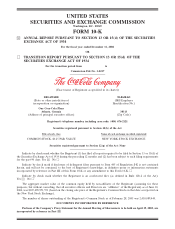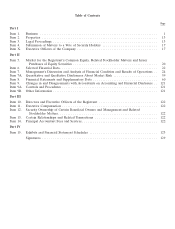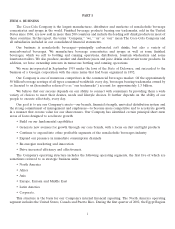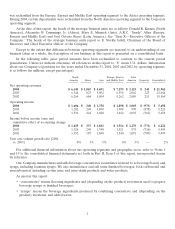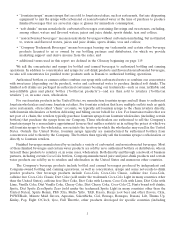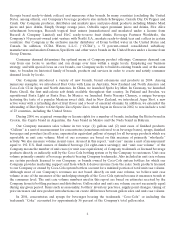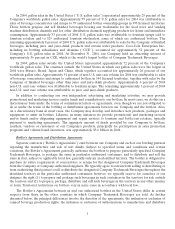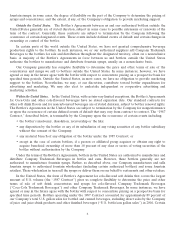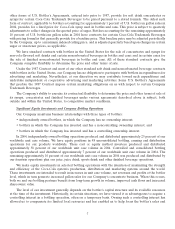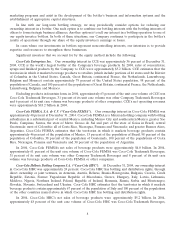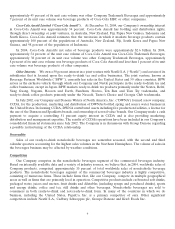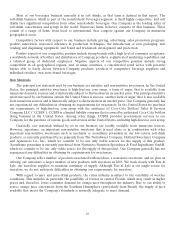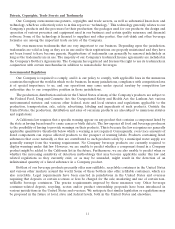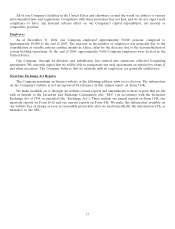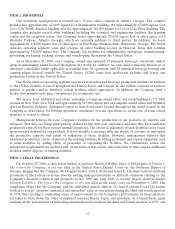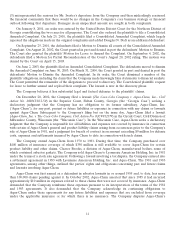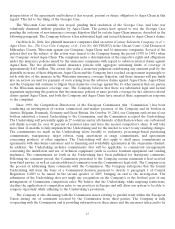Coca Cola 2004 Annual Report Download - page 7
Download and view the complete annual report
Please find page 7 of the 2004 Coca Cola annual report below. You can navigate through the pages in the report by either clicking on the pages listed below, or by using the keyword search tool below to find specific information within the annual report.
In 2004, gallon sales in the United States (‘‘U.S. gallon sales’’) represented approximately 28 percent of the
Company’s worldwide gallon sales. Approximately 59 percent of U.S. gallon sales for 2004 was attributable to
sales of beverage concentrates and syrups to 79 authorized bottler ownership groups in 393 licensed territories.
Those bottlers prepare and sell finished beverages bearing our trademarks for the food store and vending
machine distribution channels and for other distribution channels supplying products for home and immediate
consumption. Approximately 33 percent of 2004 U.S. gallon sales was attributable to fountain syrups sold to
fountain retailers and to 525 authorized fountain wholesalers, some of which are authorized bottlers. The
remaining approximately 8 percent of 2004 U.S. gallon sales was attributable to sales by the Company of finished
beverages, including juice and juice-drink products and certain water products. Coca-Cola Enterprises Inc.,
including its bottling subsidiaries and divisions (‘‘CCE’’), accounted for approximately 52 percent of the
Company’s U.S. gallon sales in 2004. At December 31, 2004, our Company held an ownership interest of
approximately 36 percent in CCE, which is the world’s largest bottler of Company Trademark Beverages.
In 2004, gallon sales outside the United States represented approximately 72 percent of the Company’s
worldwide gallon sales. The countries outside the United States in which our gallon sales were the largest in
2004 were Mexico, Brazil, Japan and China, which together accounted for approximately 26 percent of our
worldwide gallon sales. Approximately 91 percent of non-U.S. unit case volume for 2004 was attributable to sales
of beverage concentrates and syrups to authorized bottlers in 544 licensed territories, together with sales by the
Company of finished beverages other than juice and juice-drink products. Approximately 6 percent of 2004
non-U.S. unit case volume was attributable to fountain syrups. The remaining approximately 3 percent of 2004
non-U.S. unit case volume was attributable to juice and juice-drink products.
In addition to conducting our own independent advertising and marketing activities, we may provide
promotional and marketing services and/or funds and consultation to our bottlers. In most cases, we do this on a
discretionary basis under the terms of commitment letters or agreements, even though we are not obligated to
do so under the terms of the bottling or distribution agreements between our Company and the bottlers. Also,
on a discretionary basis in most cases, the Company may develop and introduce new products, packages and
equipment to assist its bottlers. Likewise, in many instances we provide promotional and marketing services
and/or funds and/or dispensing equipment and repair services to fountain and bottle/can retailers, typically
pursuant to marketing agreements. The aggregate amount of funds provided by our Company to bottlers,
resellers, vendors or customers of our Company’s products, principally for participation in sales promotion
programs and volume-based incentives, was approximately $3.6 billion in 2004.
Bottler’s Agreements and Distribution Agreements
Separate contracts (‘‘Bottler’s Agreements’’) exist between our Company and each of our bottling partners
regarding the manufacture and sale of soft drinks. Subject to specified terms and conditions and certain
variations, the Bottler’s Agreements generally authorize the bottlers to prepare particularly specified Company
Trademark Beverages, to package the same in particular authorized containers, and to distribute and sell the
same in (but, subject to applicable local law, generally only in) an identified territory. The bottler is obligated to
purchase its entire requirement of concentrates or syrups for the designated Company Trademark Beverages
from the Company or Company-authorized suppliers. We typically agree to refrain from selling or distributing or
from authorizing third parties to sell or distribute the designated Company Trademark Beverages throughout the
identified territory in the particular authorized containers; however, we typically reserve for ourselves or our
designee the right (1) to prepare and package such beverages in such containers in the territory for sale outside
the territory and (2) to prepare, package, distribute and sell such beverages in the territory in any other manner
or form. Territorial restrictions on bottlers vary in some cases in accordance with local law.
The Bottler’s Agreements between us and our authorized bottlers in the United States differ in certain
respects from those in the other countries in which Company Trademark Beverages are sold. As further
discussed below, the principal differences involve the duration of the agreements; the inclusion or exclusion of
canned beverage production rights; the inclusion or exclusion of authorizations to manufacture and distribute
5

